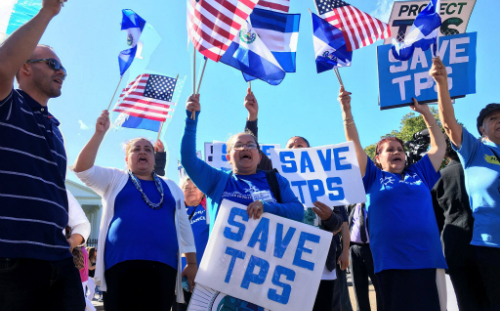
A protest in Washington, D.C. calling on elected officials to protect TPS. Bryan Vana / AFSC
Today, more than 800,000 immigrants in the U.S. have Temporary Protected Status (TPS). TPS is a provision under which the government protects people from deportation from certain countries afflicted by natural disasters, war, or other dangerous conditions.
During President-elect Trump’s last administration, he worked to end TPS and strip the status from thousands of people. Today, we must do all that we can to protect this vital program while advocating for a pathway to citizenship for all immigrants.
Here’s what you need to know.
1. What is TPS?
Temporary Protected Status (TPS) is a status that allows nationals of certain countries to live and work in the United States without threat of deportation for a limited time, with the possibility of being extended and redesignated. The TPS program was created by a bipartisan act of Congress in 1990, after years of organizing and advocacy across the country of immigrants and their allies. The law allows the Department of Homeland Security (DHS) to grant TPS to people from certain countries when catastrophic events occur, including war, famine, natural disasters, and epidemics.
Since its inception, the TPS program has served as a lifeline for hundreds of thousands of people already in the U.S. when disasters struck their home countries. However, TPS is a temporary, humanitarian form of relief that does not grant permanent residence in the U.S. A country’s TPS designation can be made for six, 12, or 18 months. At least 60 days prior to the expiration date, the DHS secretary must decide whether to extend or terminate a country’s TPS designation based on conditions in that country.
2. Who benefits from TPS?
Today, TPS protects around 330,000 people in the U.S. from 16 countries. Without this protection, they would otherwise be at risk for deportation to areas facing extreme violence, starvation, the aftermath of natural disasters, and other potentially life-threatening conditions.
As of December 2024, the following 16 countries were designated for TPS, according to U.S. Citizenship and Immigration Services:
- Afghanistan
- Burma
- Cameroon
- El Salvador
- Ethiopia
- Haiti
- Honduras
- Nepal
- Nicaragua
- Somalia
- South Sudan
- Sudan
- Syria
- Ukraine
- Venezuela
- Yemen
Most TPS recipients have been in the U.S. for decades and are vital members of our communities. TPS has helped them to better adjust to life in the U.S., earn money to support themselves and their families, and contribute to their communities and the economy. TPS holders are employed in key essential industries including health care, food industries, transportation, delivery, and warehousing.
3. Where does TPS stand now?
TPS community members, advocacy organizations, social justice groups, and other allies are fiercely advocating for a path to citizenship for all TPS holders. They are also calling to preserve the option of designating additional countries for TPS when conditions require protection from deportation. Despite calls by Members of Congress and others to end TPS, the program remains in place and TPS holders are still protected.
4. Can the president end TPS?
The president and their administration (Department of Homeland Security) do have the power to grant, extend, and redesignate TPS for particular countries. Any attempt by the administration to terminate TPS will likely be met with litigation. Since TPS was established through congressional legislation, only an act of Congress can permanently terminate the program
5. How do U.S. policies create the need for TPS?
The U.S. has a history of contributing to instability in countries covered by TPS. In Honduras, El Salvador, Nicaragua, and Haiti, for example, the U.S. supported totalitarian regimes and paramilitary forces—contributing to conditions that forced people to leave.
Today, the U.S. continues to push for increased militarization of security in Central America, exacerbating violence and fueling forced migration—all while advocating for trade and investment policies that deepen poverty and inequality.
6. What can we do to protect TPS?
Regardless of who is president, immigrants, allies, and advocacy organizations—including AFSC—will keep organizing and advocating to protect this vital program. In the months and years ahead, we will provide opportunities and resources for people to join our efforts.
Ultimately, we need legislation to provide permanent protections for TPS holders and all immigrants in the U.S. It’s time that we recognize immigrants as vital members of our community by creating a pathway to citizenship for all and strengthening temporary protections in the meantime.
